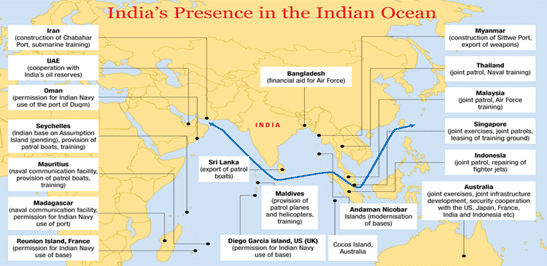

|
Overview
|
Context
Since the 26/11 Mumbai attack, there has been a long-standing proposal to implement a satellite-based vehicle surveillance system; however, the project is currently stalled. The long unfulfilled travel heightens the threat to marine security.
Background
- India with its vast coastline, is exposed to threats emerging from the marine domain.
- Following the 26/11 incident in Mumbai, the Indian government strengthened its attention on marine security.
- Aside from maritime terrorism, the blue economy, which is a significant part of the Indian economy, needs the security of the fishing society and their livelihood.
- The Tokyo summit of the QUAD grouping increased the spotlight on maritime security problems in the Indo-Pacific area and established an extensive Indo-Pacific Maritime Domain Awareness (IPMDA) initiative.
- On the strategic front, the Indo-Pacific is gaining significance to fulfill the interests of major powers of the world, providing a ground for the power tussle of the countries.
Analysis
Why maritime security is important for India?
- Water for trade: Because most of India's imports and exports are carried out via marine water, safeguarding coastlines is critical to economic development.
- Maritime threats: As evidenced by the 26/11 Mumbai attacks, India's large coastline of around 7000 kilometers makes it more vulnerable to maritime dangers.
- Blue economy: One of the major economic activities of the coastal states of India, comprising around 4% of the Indian economy, with an immense future potential.
- Strategic Factor: China's growing influence and aggressiveness in the Indian Ocean Area poses a possible danger to India's regional interests.
- Security of the fisherman
- Ocean resource security

What are the persistent issues in Maritime Security?
- Piracy: One of the most persistent threats to maritime security is pirate strikes on ships and boats.
- Terrorism: International seas provide a secure environment for terrorist groups to carry out their operations.
- Illegal migration: International waters serve as a safe gateway to enter into another country’s territory. Illegal migration occurs at a greater rate across marine waters.
- Transnational Organised crimes: Maritime waterways are also exploited for organized transnational crimes that influence the global economy and state security, such as narcotics and drug trafficking, gun trafficking, and human trafficking.
- Environmental Concern: Rising pollution and climate change have threatened marine and aquatic life along with creating a severe influence over natural calamities like floods and cyclones.
Mechanisms available for combating maritime security:
- The United Nations Convention on the Law of the Sea (UNCLOS) offers a framework for governments' rights and responsibilities in international waterways.
- SAGAR (Security and Growth for All in the Region) Doctrine: An Indian program intends to strengthen economic and security cooperation with its maritime neighbors while also improving their security capabilities.
- Indo-Pacific Oceans’ Initiative (IPOI)
- The Quad initiative aims to ensure a secure, safe, and free Indo-Pacific area.
- National level mechanism:
- The Customs Marine Organisation
- The Indian Coast Guard
- Operation Tasha
- Operation Swan
- Monitoring system
What are the biggest issues for India's marine security?
- No proper legislative structure: Implementation of legislative method regarding maritime security faces certain hurdles:
- State List issue: Fisheries are defined under the state list barring the central government to legislate over the subject.
- Hindrances from fishermen: Vehicle surveillance systems cannot be imposed because of agitation from the fishing community to protect their privacy regarding good yield and illegal activity.
- Transnational Interest: India shares its international waters with other countries as well, e.g., Sri Lanka., which hinders the process of stringent legislative actions on maritime security.
- Nonobedience over international laws and arbitration process.
- Lack of Universal International laws over international waters.
- Geopolitical dominance over security interest.
What should be done?
- Five points agenda on maritime security by UNSC
- Free maritime trade has no limitations to genuine trade;
- Maritime issues should be settled peacefully and solely under international law.;
- Responsible marine connection should be supported;
- Need to collaboratively address marine risks presented by non-state actors and natural disasters;
- Preserve the marine environment and resources.
- Diplomatic channels should be strengthened to improve engagement with marine neighbor states.
- Coastal development proposals should be fulfilled.
- Enforcement of state police to secure maritime boundaries.
- Vehicle monitoring system for the fishing vessels
- Satellite monitoring of weather forecast and disaster resilient preparedness
Conclusion
Coastal security requires various stakeholders with both independent and shared duties. As a result, coordination among these agencies must be ensured through an integrated approach that focuses on the important components indicated below while being aware of any restrictions and constraints imposed by partner agencies. This should take into account the unique demands of changing threat levels, such as situations in which a coastal security operation might have to rapidly convert into a coastal defense operation, requiring the coordinated deployment of forces from several maritime agencies.
|
Practice Question Q1. How has India addressed illegal, unreported, and unregulated (IUU) fishing in the Indian Ocean? Examine the importance of the Indo-Pacific Maritime Domain Awareness (IPMDA) effort in this regard. Q2. India's coastlines have long been targets of criminal and anti-national activity. Discuss the potential risks and emphasize India's coastline security measures. |


